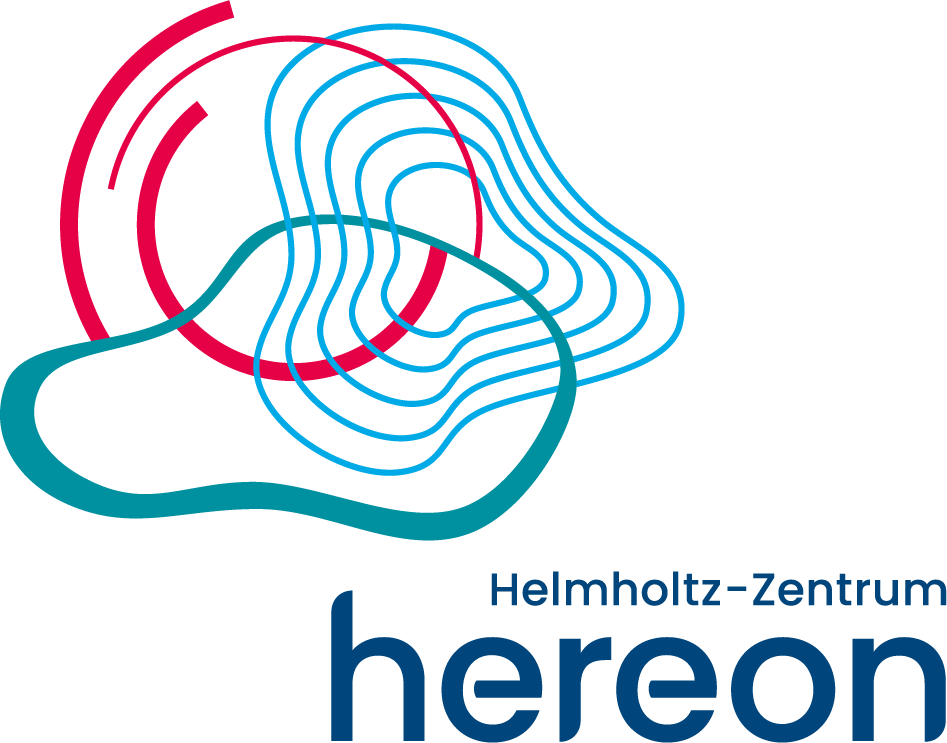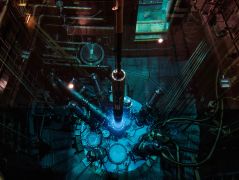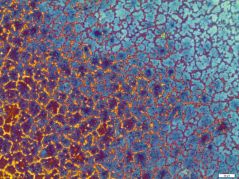MLZ is a cooperation between:
 > Technische Universität München
> Technische Universität München > Helmholtz-Zentrum Hereon
> Helmholtz-Zentrum Hereon
 > Forschungszentrum Jülich
> Forschungszentrum Jülich
MLZ is a member of:
 > LENS
> LENS > ERF-AISBL
> ERF-AISBL
MLZ on social media:

MLZ (eng)
Lichtenbergstr.1
85748 Garching
18.09.2024
Excellent research for the conversion
Dr. Bruno Baumeister and Dr. Christian Reiter from FRM II have received the Instrumentation Award of the Committee Research with Neutrons (KFN) to further develop neutron sources. The award ceremony took place during the German Neutron Scattering Conference in Aachen.

Bruno Baumeister (right) and Christian Reiter (left) receive the KFN Instrumentation Award for their work on converting the FRM II to low-enriched uranium. © Andreas Heddergott / Bernhard Ludewig, FRM II / TUM
Bruno Baumeister, project leader FRM II LEU conversion, and Christian Reiter, reactor physicist at FRM II and head of the Center for Nuclear Safety at the Technical University of Munich (TUM), receive one of the two KFN Instrumentation Prizes 2024, as they have jointly initiated the conversion of the Heinz Maier-Leibnitz research neutron source (FRM II) to fuel of low enrichment uranium while maintaining its scientific performance. A challenging task, the solution is attracting great interest worldwide due to its transferability to other research reactors, according to the KFN’s justification for the award.
“King of simulation” and major EU funding programs
Laudator Dr. Axel Pichlmaier, Technical Director of the FRM II, admits in his laudatory speech: “Without Mr. Baumeister and Mr. Reiter, the conversion of the FRM II to a low-enriched fuel would hardly be conceivable.” And he continues: “Mr. Baumeister has worked on the four major European funding programs for the development of high-density uranium fuels with increasing responsibility. Mr. Reiter is the “king of simulation”. He confidently pulls out all the stops of what is possible today and develops … the complete three-dimensional calculation of reactor cores.”

Prof. Dr. Sabrina Disch (Univ. Duisburg-Essen, KFN, r.) awards the prize to Dr. Bruno Baumeister (l.) and Dr. Christian Reiter. © MICHA HOELZLE
Effects far beyond the FRM II
The KFN further explains the reasons for the award: “The FRM II is considered particularly difficult to retrofit worldwide. Together, Mr. Baumeister and Mr. Reiter have shown the way forward. Their R & D work impacts far beyond the FRM II.”
Other award winners from France and Jülich
Around 200 researchers met from 16-18 September 2024 at the German Neutron Scattering Conference 2024 in Aachen, organized by the Committee Research with Neutrons (KFN), Forschungszentrum Jülich and RWTH Aachen University. The focus is on using neutrons for a wide range of issues, from energy materials and the effects of medicines to the universe’s origin. In addition to Baumeister and Reiter, the KFN honored two other young scientists. The Wolfram-Prandl Prize for Young Scientists went to Dr. Leonardo Chiappisi (Institut Laue-Langevin, ILL, France) for his research on polymer-based soft matter. Dr. Paul Zakalek (Forschungszentrum Jülich) received the second prize for instrumentation.

KFN Award Ceremony 2024: From left to right: Paul Zakalek (Forschungszentrum Jülich), Thomas Brückel (Forschungszentrum Jülich), Christian Reiter (TUM), Axel Pichlmaier (TUM), Leonardo Chiappisi (ILL), Emanuel Schneck (TU Darmstadt), Bruno Baumeister (TUM), Sabrina Disch (Univ. Duisburg-Essen, KFN). Copyright: Michael Hölzle/Forschungszentrum Jülich © Michael Hölzle/Forschungszentrum Jülich
Variety of neutron experiments
Scattering experiments with neutrons can answer questions that are difficult to answer with other methods, for example, on the magnetic properties of matter, the internal properties of solid workpieces or sensitive cultural assets, or the mode of action of drugs. In addition, radioisotopes can be used to make tumors visible and treat them gently.
Neutron scattering conference brings experts together
The German Neutron Scattering Conference, therefore, brings together experts and users as well as researchers from various disciplines from Germany, Europe, and the rest of the world. A particular focus of the conference is the further development of existing and new types of neutron sources, which is being promoted not only in Germany but all over the world due to the importance of research with neutrons.
Prizes endowed with 2500 euros
The Research with Neutrons Committee represents scientists who work with neutrons or who are closely associated with research using neutrons. The KFN offers a wide range of information for researchers and the interested public on its website www.neutronenforschung.de. The KFN prizes funded in equal parts by the neutron centres Helmholtz-Zentrum Hereon, European Spallation Source in Lund, Sweden, Research Neutron Source FRM II, Jülich Centre for Neutron Science and Institut Laue-Langevin (ILL). They are endowed with 2500 euros.
Original text: Dr. Karin Griewatsch, KFN
More information:
KFN Prizes
Press release of the KFN
Contact:
Public Relations KFN
Karin Griewatsch
kfnadmin@sni-portal.de
KFN Chair and Chair of DN2024
Mirijam Zobel
zobel@ifk.rwth-aachen.de
Related News
-
07.04.2017
EU supports development of new fuels
MLZ is a cooperation between:
 > Technische Universität München
> Technische Universität München > Helmholtz-Zentrum Hereon
> Helmholtz-Zentrum Hereon
 > Forschungszentrum Jülich
> Forschungszentrum Jülich
MLZ is a member of:
 > LENS
> LENS > ERF-AISBL
> ERF-AISBL
MLZ on social media:





